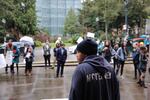Portland Mayor Ted Wheeler wants to hire anywhere from 14 to 93 more police officers — but he didn't mention that in his State of the City address.
In fact, Wheeler planned to mention that he would ask city councilors for permission to hire more officers at the bureau ahead of the release of his proposed budget, which he expects to unveil at the end of the month. Wheeler's speech was peppered with small glimpses into what major issues the mayor plans to address in that budget.
Instead, the mayor appeared to go off notes from prepared remarks sent to media ahead of the speech at Portland Community College Southeast, only alluding to the idea of hiring more officers.
"Portland's population continues to grow, response time continues to increase, and it is irresponsible for any elected official to not respond to that reality," Wheeler said. "I don't care if you love the police or you hate the police. There is one truth that drives all of this in my mind: When you pick up the phone because you or somebody you love is in crisis and you call 911, you expect the police to show up and you expect the police to show up on a timely basis."
His speech Thursday comes less than a week after after seven Portland police officers and one Multnomah County Sheriff's deputy shot at and killed 48-year-old John Elifritz at a Southeast Portland homeless shelter.

People gathered outside Portland City Hall April 11, 2018 following the death of 48-year-old John Elifritz. Elifritz was shot by police.
Dirk VanderHart / OPB
In the first of two State of the City addresses he’ll deliver, Wheeler said understaffing at the bureau has made it difficult and almost impossible for police to respond to incidents on a timely basis.
That's a different message from what protestors demanded at a Wednesday rally outside Portland City Hall. About 100 people gathered to protest the deadly weekend shooting of Elifritz. Elifritz was allegedly showing suicidal tendencies while holding a knife before the shooting. People at the protest called for use of force reform at the bureau.
“When you see somebody in a mental health crisis, please do not call the police," said Ree Campbell with the international nonprofit Boots on the Ground at the rally. "Do not call the police. They will die.”
Wheeler didn’t mention the shooting in his address, but he did appear to be aware of the anticipation for what he would say about the bureau.
"Here's the controversial part of the speech you've all been waiting for," Wheeler said before transitioning to the subject.
Wheeler did mention a U.S. Department of Justice settlement agreement finalized with the city in 2014 to improve how the police bureau responds to people experiencing mental health crises.
“That is why the Portland Committee on Community-Engaged Policing — PCCEP — will be so important,” Wheeler said. “For the first time, there will be formal and direct collaboration between the police bureau and a citizen body on policy development. This goes beyond the settlement agreement and straight to the heart of what Portlanders have been demanding for years. It’s long overdue.”
Related: A New Homeless Center Is Coming To The Pearl District
Wheeler’s speech began with what he called “the things that are right with Portland” before transitioning into the challenges associated with the city’s rapid growth — housing, homelessness and the city’s racist history.
“Where are we all going to live?” Wheeler asked. “Where are we going to work? How are we going to get around with increasing traffic congestion? And, as we continue to grow as a city, how do we keep Portland affordable for those who have lived here for generations?”
Wheeler provided a small window into his upcoming proposed budget. Wheeler said he’d dedicate the first dollars in his budget to address homelessness and that he’ll continue to invest in the Joint Office of Homeless Services, a collaboration between city and Multnomah County agencies.
“We can’t continue to call ourselves a progressive city as so many of our neighbors live, and too often die, on our streets. Homelessness represents nothing short of a humanitarian crisis,” he said.
Specifics about how much Wheeler would allocate to those projects were not provided.
Related: Portland Police Chief Orders Stop To Use Of Active Gang List
Wheeler also announced that he’ll include money in the budget to hire an analyst for the Portland Police Bureau’s Office of Equity and Diversity to analyze data on police stops and hiring decisions.
In March, a city audit of Portland's Gang Enforcement team became the latest report to question whether policing tactics in some Portland neighborhoods lead to over-policing and racial profiling of African-Americans.
Wheeler also said implicit bias training for officers is scheduled to begin in May.